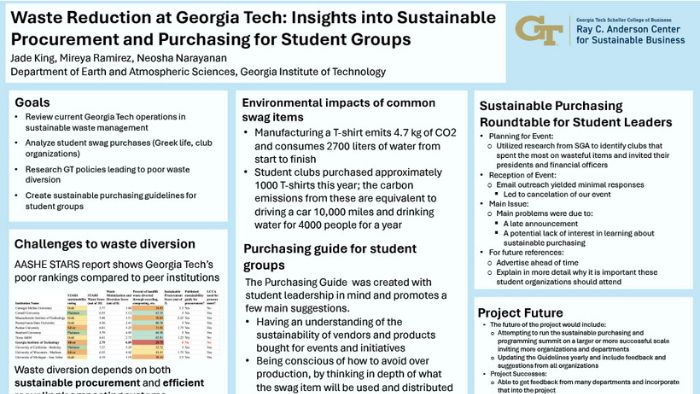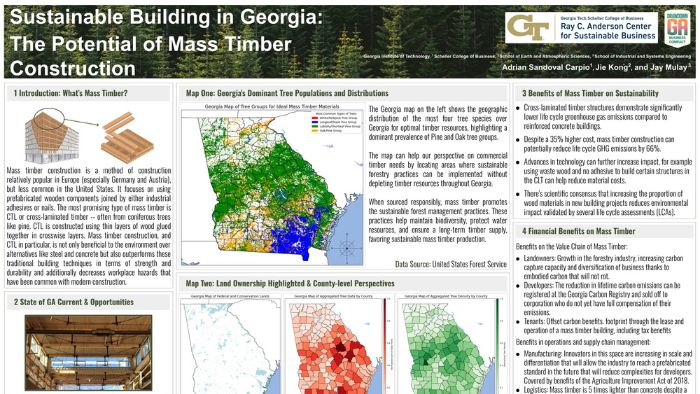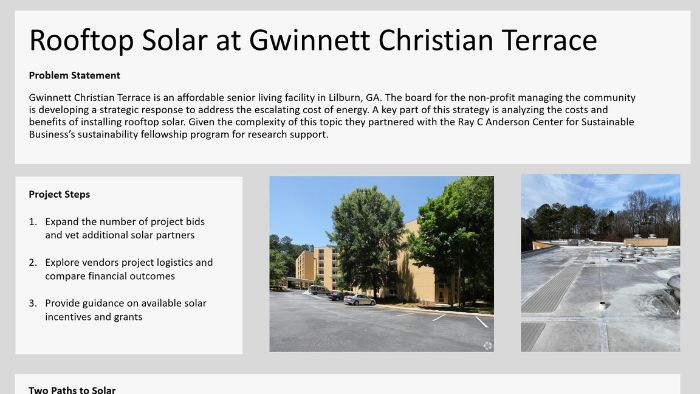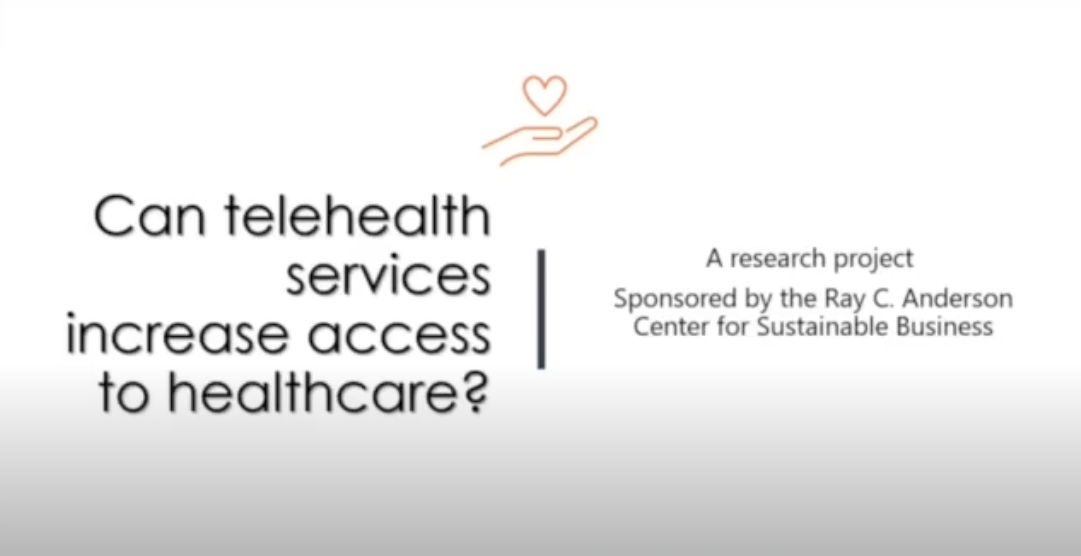Sustainability Fellows and Undergraduate Sustainability Ambassadors deepen their engagement in environmental and social issues for business by working on projects.
Fellows and Ambassadors Projects

2024-25 Projects
The following videos represent the project outcomes for 2024 - 2025.
UMC Global Ministries: How Faith-Based Organizations Can Contribute To Climate Action
Fellows: Tom O'Brien and Vivian Ritter.
This team examined the carbon offset program of the United Methodist Church’s Global Ministries, which invests in sustainable development projects across the globe. By analyzing how faith-based organizations can contribute to climate action, the team explored both the ethical framework and practical impact of these offset initiatives. Their work highlights how mission-driven efforts can align with environmental goals to foster holistic, community-centered solutions.
Market Research of Weatherization Carbon Credit Incentives for Private Corporations
Fellows: Audrey Griffin, Vadym Nahornyi, and Ansley Nguyen.
The team conducted a year-long market research study for the Drawdown Georgia Businesses Compact on how private businesses can invest in and receive carbon credits for home efficiency improvements. Through their research, they were able to narrow down the scope of the idea as well as conduct several interviews with industry leaders, such as the Maine housing authority, where similar projects have been conducted in the past, with their final deliverable being a research report to the Drawdown Georgia Businesses Compact.
The Environmental Impact And Use Of LLMs (Large Language Models)
Fellows: Andrew Pietkiewicz, Vidhi Kulkarni and Khim Varavan.
This team explored the growing issue area of the rapid expansion of Artificial Intelligence and its environmental footprint. They investigated the physical energy and water consumption footprint of AI training and maintenance, specifically from data centers, and worked with a diverse group of stakeholders in order to create a white page deliverable surrounding best practices for sustainably developed AI.
AI-Powered Waste Auditing With The Epsten Group And REGO
Fellows: Lauren Dasher, Shutong Guo, and Nabeel Ahmad.
In partnership with the Epsten Group and the AI waste-auditing startup Rego, this team implemented Rego's photo-based waste tracking system to improve Epsten's waste diversion efforts. The work included conducting waste audits, hosting cross-office engagement sessions, and testing strategic recommendations for scalable, company-wide adoption of Rego's AI waste-tracking tool.
Tracking Sustainability-Related Financial Incentives With CBRE
Fellows: Ambarish Kota, Sarah Hailu, Cyra Alesha and Anshu Nagabhairava.
The team partnered with CBRE to create an automated Python-based scraper that collects and parses data on sustainability-related financial incentives. It generates a clean, filterable Excel sheet tailored to CBRE’s needs, simplifying access to relevant funding opportunities.
Mapping Properties to Green Certificates

Fellows: Clare Chung, Noelle Watkins, Sofia Romero-Delgado and Krishnam Thirumala.
This project partnered with the sustainability team at CBRE to create a tool that can match entered property attributes to potential green building certifications and their specific criterion. This tool will help CBRE to evaluate their various properties in terms of the current sustainability goals that they meet as well as a plan for improving sustainability needs for the future.
Optimizing Vehicle Usage With Friends Of Refugees
Fellows: Justin Le and Anthony Lecca.
To optimize the friends of refugees vehicle fleet, the team conducted an analysis into the organizations transportation history. We also explored opportunities for local partnerships by contacting Georgia-based nonprofits with similar goals of assisting refugees.
Waste Not, Watch Lots: Raccoon Eyes AI on Food Waste
Fellows: Ivan Santillan, Catherine Dent, and Nikhita Chinmay .
Raccoon Eyes is an AI-powered monitoring system developed to track and analyze food waste in school kitchens and dining halls. By combining real-time image recognition with data analysis, our project aimed to identify waste patterns, inform menu and portion adjustments, and support long-term sustainability education efforts in school food programs.
Sustainable Lending & Impact with Bancolombia
Fellows: Mariana Anargyrou, Sydney Elmore, Rose Espiritu and Ezra Mahle.
This project team partnered with Bancolombia to develop data driven methodologies that quantify the economic and societal value generated through sustainable lending practices. By analyzing key financial project segments, including commercial, consumer, mortgage, and microcredit, the project introduced replicable frameworks to evaluate how the bank's activities serve as engines for employment and economic vitality across Colombia.
2023-24 Projects
The following videos represent the project outcomes for 2023 - 2024.
Sustainable Purchasing for Student Organizations
Fellows: Jade King, Mireya Ramirez, and Neosha Narayanan.
This project focused on advising students on how to make more sustainable purchases for merchandise and programming. This was done through a review of the current state of sustainable purchasing in the target audience and then advisement through creation of a guideline and education event.
Developing a new outreach-based business strategy for a local family-owned cafe
Fellows:Sanam Patel, Sakshi Deshpande, and Kate Albertus.
The team partnered with "Imagine That! Cafe and Bakery" to create a new marketing plan by connecting with Atlanta influencers, promoting their catering initiatives, and curating a new social media strategy. The resulting increase in revenue from this plan could be used towards the cafe's goal to utilize sustainable packaging and delivery processes in the future.
The Potential of Mass Timber Construction in Georgia
Fellows: Adrian Sandoval, Jay Mulay, and Jie Kong.
This team studied the viability of mass timber building as a driver to reduce one of the largest and most complex sources of emissions: the construction industry. Their study analyzed the benefits and gaps of the technology and its lifecycle, with a focus on how Georgia can become one of the leaders in the future of mass timber as a sustainable building material, helping both local landowners, private companies and society as a whole.
Plastics Circularity Initiative
Fellows: Jessica Patino and Xiaoyang Xia.
This project is to advocate plastics circularity initiative for DDGA Business Compact. The team created a pamphlet, stakeholder analysis and case study to supplement the recycling and waste management page on DDGA Business Compact website.
Stryten Energy Site Selection Tools
Fellows: Ashley Zheng, Jiashu Li, Michael Hayes, and Rohan Datta.
This team worked with Stryten Energy, developing screening tools to assist in the site selection of their first-of-its-kind “Southeast Energy Park” development. The team leveraged comparative market research, J40 analysis and impact assessment scoring, and longitudinal GIS mapping to create a more contextualized and comprehensive picture of each potential site.
WunderGrubs Circular Food Waste Reporting
Fellows: Claire Patrick, Leila Benjelloun, Molly Prucha, and Tatiana Agbeyibor.
This team created a tool to help Wunder Grubs identify GHG Protocol reporting requirements and evaluate their readiness to meet increasinly stringent reporting standards. This tool will be valuable in helping the client to calculate the full scope of their emissions and their potential to offer emission offsets as well as mentor their clients on meeting reporting requirements.
Integration of Equity in Education and Grants
Fellows: Amanda Ehrenhalt and Wyatt Willams.
In partnership with the Ray C. Anderson Center for Sustainable Business, Amanda's and Wyatt's projects aimed to infuse equity, sustainable development goals, and justice into the Scheller School of Business through an infusion program and a pilot grant project. The infusion program integrated sustainable development and equity topics into the core curriculum and electives of the Scheller MBA courses, and the grant project involved creating workshop documents that guided decision-makers in the Drawdown Georgia Business Compact to design climate-action grants to address inclusion, accessibility, and distribution of outcomes.
Sustainable Strategies Powering Savings
Fellows: Laura McComb.
Gwinnett Christian Terrace, an affordable senior living facility, partnered with the Ray C. Anderson Center to evaluate rooftop solar as part of their strategy to address rising energy costs. The fellow on this project vetted several solar companies and expanded the scope to explore additional opportunities to address utility costs. Based on this work, the board is actively pursuing funding for the solar installation and plans to conduct an LED retrofit with a projected NPV of $42,685.
2022-23 Projects
The following videos represent the project outcomes for 2022 - 2023.
UMC Global Ministries-Emission Reduction Measurement Tool
Fellows: Hannah Shin, Spenser Wipperfurth, Philip Johnston, and Nathan O, Connor.
This team created a tool to help UMC Global Ministries estimate the amount of project-specific emissions reduction related to installing off-grid solar systems. This tool will be valuable in helping the client to reach its goal of net-zero emissions by 2050.
Tracking Georgia Tech Waste Management Data and Emissions

Fellows: Lily Sullivan, Devanshi Patel, Brandon Bermudez Bolivar, and Ritu Atreyas.
This team conducted a comprehensive analysis of Georgia Tech's waste data, identifying the primary waste streams on campus and prioritizing the calculation and tracking of emissions associated with each stream. Their project was dedicated to formulating a strategic plan to enhance sustainability efforts and foster a more environmentally conscious future for the university.
The University Global Coalition-Developing a Collaboration Tool

Fellows: Shelby de Jongh, Cadence Martin, and Bhandan Kumar.
This team collaborated with the University Global Coalition, an international alliance of educational institutions committed to fostering cross-border cooperation, innovation, and sustainable development in higher education. Their goal was to create a valuable connection tool. Through extensive research, including surveys and interviews with students and administrators, the group designed a website tool that effectively connects students with sustainability opportunities.
Increasing Student Engagement with the Ray C. Anderson Center for Sustainable Business
Fellows: Sarah Eidizadeh, Meghana Embar, and Hank Hudson.
Working with staff at the Ray C. Anderson Center for Sustainable Business, the team proposed a three-part strategy to increase undergraduate engagement with the Center. The strategy includes creating a website outline, workshop proposals based on a student survey, and identification of social media opportunities and enhancements.
Comprehensive Carbon Emissions Reduction Plan for Manufacturing Excellence
Fellows: Maitraiyee Mohan, Laura C Betancourt, Writuparno Ganguli, and Amruth Surapaneni.
This team collaborated with a manufacturer to develop a comprehensive action plan aimed at achieving its ambitious emissions reduction goal by 2025. Through meticulous research and analysis, the team explored various alternative fuel options, including the promising solution of green hydrogen derived from renewable energy sources, to address the company's emissions concerns.
A Powerful Tool for Tailored Carbon Emission Reduction Strategies
Fellows: Emily Schroeder, Jenna Sitta, Azell Francis, and La'Darius Thomas.
This team partnered with a forward-thinking company concerned about greenwashing as related to its carbon reduction goal. The team created a comprehensive tool to help the company choose the best carbon reduction strategy, ensuring genuine progress and avoiding greenwashing pitfalls.
Heat Mapping and Tree Planting Plan for Vine City
Fellows: Alex Cherecwich, Margaret Sanders, Christopher Prosceno, and Joshua Frank.
Utilizing state-of-the-art heat map data, the team identified Vine City as one of the most heat-affected areas in Atlanta. Heat islands are urbanized areas that experience higher temperatures than outlying areas. To help alleviate heat islands, the team created a tree planting plan consisting of roadside plantings and tree installations on empty lots.
Generation 2: Reinvented Toilet Outreach
Fellows: Shalini Moua and Joanna Thomas.
The team partnered with the Kendeda Building and Shannon Yee, associate professor in the School of Mechanical Engineering, to create marketing and tour content about the reinvented toilets located in the Kendeda Building. Reinvented toilets treat waste in the back end of the toilet system, reducing the need for major wastewater infrastructure.
2020-2021 Projects
The following videos represent the project outcomes for 2020 - 2021.
Patagonia - Carbon Finance
Fellows Henry Miller and Miguel Granier
The project looked at the carbon sequestration capacity of the Patagonia National Park region in Chile and the potential for carbon offsets to fund ongoing conservation effort (Associated with the Vertical Integrated Projects - Patagonia at Georgia Tech).
National Parks Diversity Infusion
Fellows Abigail Brenller and Tiffany Cho
Abigail and Tiffany investigated the diversity problems within the national parks by identifying the barriers to inclusivity in workplace environments and also defining a long-term recruiting strategy. They hope to increase awareness of employment in the National Park Service within diverse populations and better understand the challenges those populations may face when working in the organization.
Georgia Tech Green Revolving Fund
Fellows Eddie Massey and Shawn Buckley
Eddie and Shawn explored the viability and metrics for Georgia Tech to successfully implement a Green Revolving Fund. This Fund will allow for regenerative capital to be employed on sustainability-related projects at the university, while driving interest and participation of students on campus.
Drawdown Georgia Project - Advancing Equity
Ambassador Zachary Jones and Fellow Daphne Saavedra
Zachary and Daphne worked with Drawdown Georgia and their top 20 solutions to capture equity considerations that are the most highly impactful solutions for combating climate change in Georgia. Their project focuses on the equity solutions of conservation agriculture and equity initiatives in retrofitting the building and materials sector.
University Global Coalition Governance
Fellows Ellie Hamalian and Geoffrey Sudderth
The project examines the reduction of miles traveled in local supply chains and researches the feasibility of the use of mobile hubs that can be relocated as necessary from day to day or within a day for local food consolidation and transport. Does this use of mobile hubs reduce the number of food miles and stops?
Hydroponic Planter System
Ambassador Madeleine Hardt and Fellow Shrinka Roy
The Hydroponic Planter System team worked on a hydroponics planter subscription system for the budding, urban plant enthusiast. They developed a system that uses the Kratky hydroponics method to minimize cost and effort without compromising aesthetics.
E.T.H.O.M.E.
Ambassador Mark Leggiero and Fellows Sol Haroon and Victoria Skinner
ET HOME is a micromobility solution that brings transportation options to the town of Clarkston. Through electrified bikes and trikes, the system will connect the community through social equity by enabling greater city access for both personal mobility and light transportation of goods.
Wellbeing in the West End
Ambassador Alessandra Smith
The Mapping Mobility, Health, and Wellbeing in the West End project aimed to map the current mobility infrastructure and food accessibility, utilize current data to display any disproportional infrastructure and access in West End and identify limiters in the improvement of mobility and health and wellbeing for the community.
Local Schools
Fellows Amanda Grupp and Bangseh Akushu
This project was aimed at taking steps to engage and improve Scheller's relationship with the community around it. The project took a twofold approach; research what the need was and secondly, if deemed appropriate, set up an outreach program with some of the schools surrounding Tech. The hope of the project was to benefit Scheller by increasing community engagement, brand awareness, and access to a more diverse pipeline of talent.
The Mendstruation Project
Ambassadors Jessica Hertzberg and Suhas Yalamarti
The Mendstruation Project is an initiative to redesign the menstrual product disposal system for Georgia Tech campus bathrooms. We created an educational system to bring greater equity to our campus by focusing on women’s health, safety, and usability when interacting with menstrual disposal systems on campus.
Regenerative Energy Impact ASSMNT
Fellows Martha Jean Schindler, Patrick Knight, and Robert Riley
This team set out to quantify the environmental, social, and economic impacts of a solar power plant in southwest Georgia that is owned and operated by the Silicon Ranch Corporation. Their unique land management techniques, combined with the clean energy provided by the plant, have an important impact on the community. To better understand SRC's impact, the team partnered with Proof of Impact, who helped them use their impact assessment methodology.
Ubuntoo Greenhouse for Food Waste
Fellows Jordyn Holt and Shuaib Mohammed
Ubuntoo is a global environmental solutions platform promoting sustainable economic growth. We helped the Ubuntoo team create a Greenhouse for Food Waste solutions so information and resources will be stored in one, easy-to-navigate place on the Ubuntoo website.
Flex Packaging Recycling Market
Ambassador Kadyn Fleming and Fellow Yogesh Raparia
This team worked on a solution for recycling films and flexibles in the United States. These materials are currently unable to be recycled in the US, but by looking at recycling methods in other countries and government regulations, this team believes film and flexible recycling can be adopted.
ESG Investing Investigation
Fellows Bea Wang and Bridget Montague
This team’s research seeks to provide insights into environmental, social, and governance (ESG) investing, and shareholder intentions compared to the most popular hedge fund strategies, and the potential correlation to reduced litigation.
Sustainability in Healthcare
Ambassador Joanna Thomas and Fellow Marianna Moores
This project investigated whether telehealth services could create a more equitable healthcare system. Survey data and personal interviews with experts in health economics and telehealth distribution gave us insight into whether telehealth could be the future of accessible healthcare.







































